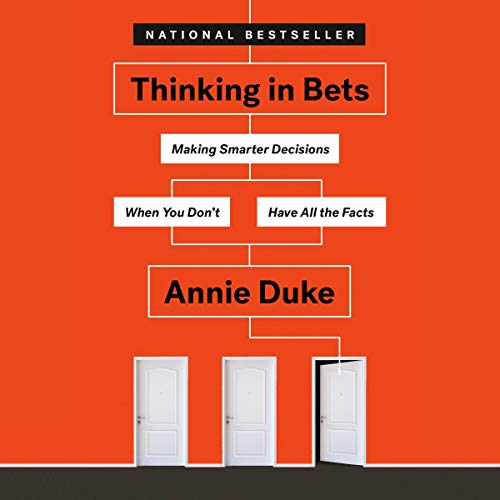Thinking in Bets by Annie Duke — My Notes


Get the book from Amazon.
Ideas I picked from the book
- It’s not only about handling learning and decision-making, but handling emotions that stem from luck and uncertainty.
- Separating outcome quality (win or loss) from decision quality, making less emotional decisions, to focus on 100 outcomes where there are more wins than losses.
- Making more System 2 than system 1 decision making.
- Seeking the truth with other people who are aligned with truth seeking.
- Living in the future and working backwards from the future.
- Modern safety nets have made caution and irrational, in-the-moment decision-making obsolete. “We will pound a lot of square pegs into round holes to maintain the illusion of a tight relationship between our outcomes and our decisions.” Also, “being wrong hurts us more than being right feels good.”
- Game Theory: “Real life consists of bluffing, of little tactics of deception, of asking yourself what is the other man going to think I mean to do. And that is what games are about in my theory.”
- “Chess, for all its strategic complexity, isn’t a great model for decision-making in life, where most of our decisions involve hidden information and a much greater influence of luck.”
- Poker: “Once the game is finished and you try to learn from the results, separating the quality of your decisions from the influence of luck is difficult.”
- “Getting comfortable with “I’m not sure” is a vital step to being a better decision-maker.” “First, “I’m not sure” is simply a more accurate representation of the world. Second, and related, when we accept that we can’t be sure, we are less likely to fall into the trap of black-and-white thinking.”
- Our beliefs keep us grounded in similar decisions
- Diversity allows us to break these decisions
- Investor work, seeing companies win and loose, which increase the accuracy of their beliefs and assumptions. Being genuinely curious about the opportunity to learn. Self-bashing after a loss or self-satisfying after a win isn’t the way to learn for the long-term.
- Applying to a startup. Often working with focus. First: build experience by spending years in the industry, preferably in jobs where you get to develop your beliefs and assumptions. They surface, get reshaped, and honed over time. B: Second, when you do your startup, stay focused on the task at hand but try to fail fast so that you can learn from your wins and losses.
- Autonomous teams. Teams make decisions, basically bets. How to improve that accuracy of the team’s beliefs and assumptions. Ideas: surface those beliefs and assumptions, share them, get feedback on them. Quarterly, have a meeting where you question two of your beliefs and make adjustments to develop accuracy on those beliefs.
- Seeing a project as a bet. You want the reward to be a commercially successful project that can be grown into an even bigger commercial success. The bet is on developing and launching a success. So how do you get there? You have limited resources, a budget for 12 months to find success. How do you fail fast? You estimate that you can fail five times, meaning that you need to start from scratch. You set a goal to learn from each failure, to develop more accuracy with each possible opportunity. You build a team that is aligned with seeking the truth.
- Games Club: a particular game is doing well in the Top Grossing charts. What is the belief and assumption why it’s doing well. For three weeks, hold sessions where you play the game and discuss the underlying systems that the game has. After the three weeks has passed, asses people’s changes in the beliefs and assumptions.





